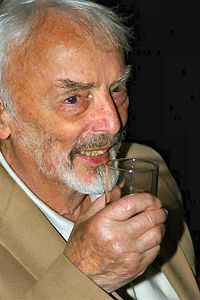 |
James Murray Cook 22.6.1924 -
25.1.2014
Old soldiers never die,
they only fade away,” was very true of James Murray
Cook, known to his friends as Murray, and, for a while
in Maybole, as The History Man.
He earned a reputation in his home town as the “go to”
person for anyone interested in the town’s history,
which was partly earned through his career, one that
spanned at least 30 years, as a brilliant public
speaker.
Murray was Honorary President of Maybole Historical
Society, of which he was a founder member, and which was
part of the reason that he received a Scroll of Honour
from Maybole Community Council. He also served on the
community council.
It says something about his value to the historical
society that, as Honorary President, he was the only
permanent member of its committee. That value was based
on his deep personal knowledge of the town but also his
firm grasp of the Scottish and European history that it
fitted into, in turn a result of being extremely well
read in those subjects.It helped, too, that he was a
broad-minded individual who had a philosopher’s ability
to take a detached view of people and their behaviour,
combined with empathy for his fellow men and women. His
version of history was balanced and rounded. |
|
|
His motivation was
not king and country, nor “public men nor cheering crowds” to quote
Yeats. Rather, it was a very personal belief that evil in the form
of Fascism was on the march and that the only honourable thing to do
was join the fight against it. So it was that he lied about his age,
ran away from home and joined up at the age of 17 in 1942. He had,
as he later wrote, “about as nasty a war as he could stomach” of
which the following is a very brief summary.
Wounded and captured in his first engagement with 1st Battalion
Paratroop Regiment in north Africa, three years spent in a Prisoner
of War camp in Poland, escape from a marching column as the inmates
were being evacuated due to Soviet advances and then eventual
return, courtesy of the Red Army, to Britain.
The nastiness to which he referred was without doubt the horrific
cruelty and suffering that he witnessed a good deal of, more even
than the personal pain and discomfort that he experienced, bad as
that was. It is characteristic that in his entry in the book
produced by the community council, “Maybole Memories World War II”
he chooses to recount a farcical episode a few days before his
capture. A man capable of great passionate commitment, he seldom
lost for long his appreciation of the ridiculous. After the war he
was stationed in British Mandated Palestine prior to the creation of
the State of Israel, in what was essentially a policing role.
On his mother’s death, soon after the war, he ran away to London, to
a friend’s house, unable to cope and “stared at a wall for three
days.” He had left the army with un-diagnosed Post Traumatic Stress
Disorder, which was no doubt common and which made him unable to
make use of the Government’s offer to allow returning service men to
study for a degree. In 1940s Britain he was another angry young man
with a tendency to drink.
His saviour came in the form of Liz Macpherson, whom he met when
they were both employed at St Thomas’s Hospital in London, where he
worked in the department sterilising equipment, and she was a
Theatre Nurse.
Desperate to settle down and have a family, he did so happily until
he had to face the greatest tragedy of his life; the death, at the
age of 9, of his first son, Quentin in 1964, from a measles
infection. This was a blow from which neither of them fully
recovered.
Above all, he was a family man who spent what little free time he
had with his wife and children. The “Glasgow Fair Fortnights” at
Maybole Shore with his wife, his children, and his closest friends,
including his brother Tom were precious to him. It was difficult for
him to keep in as much contact as he would have liked with his
extended Cook and Murray relations due to his job, which was a real
regret.
For over 20 years, Murray worked six days a week at Jellieston Farm,
by Martnaham Loch, for most of that that as a Pigman running the
piggery. The demanding exercise and fresh air suited him but not
much else. He always regretted the way he had to treat the animals
and for years afterwards avoided eating pork. He became a good
friend of his employer, Ewan Frazer, and his family.
For a few years after that he was a care officer at the List G
residential school, Lumsden House, in Maybole, again becoming a good
friend of his employer, Robin Dalrymple and his family.
Due to his determination to fight in the war he got off on the wrong
foot professionally speaking. His real talent was communicating to
audiences. Much as he enjoyed his own company and the solitary
pursuit of reading, he thrived in limelight, being a natural
performer like his father Jimmy. He was a member of Carrick Speakers
Club for a great many years, gave innumerable addresses at Burn
Suppers and St Andrew’s nights, and was for several years the judge
for the annual Jean Falconer Literary Competition open to the pupils
of Carrick Academy.
In retirement, he was able to follow his wider interests in music,
the visual arts, and cultural activities generally, with a group of
like-minded friends. He leaves behind a daughter and three sons.
A collection taken at the funeral
raised £404 which will to go to Prisoners Abroad. |